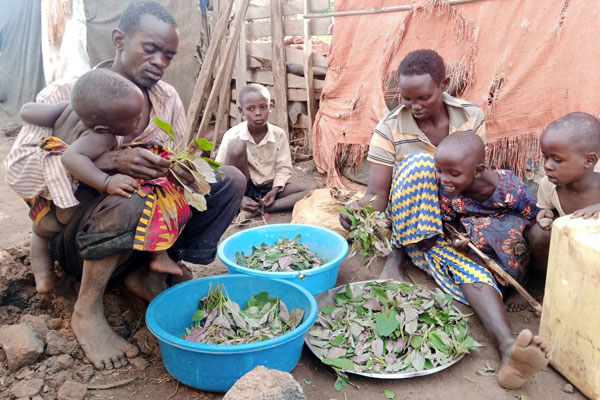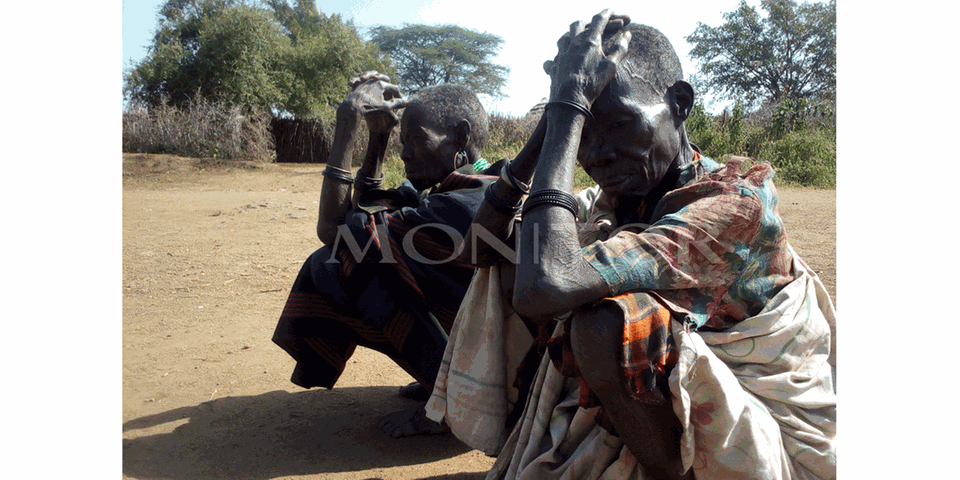Prime
Why 8 million Ugandans are going to bed hungry

A family affected by a land dispute prepare vegetables for lunch in Kiryandongo District. About eight million people are suffering from ‘chronic hunger’ in the country, according to Naro. PHOTO/BILL OKETCH
What you need to know:
- The Food and Agriculture Organisation (FAO) of the United Nations earlier warned that Uganda could lose Shs260 billion to rising temperatures by 2050 due to climate change.
- More than 90 percent of all-natural disasters facing humanity today are climate change-related, the UN agency notes.
About eight million people are suffering from ‘chronic hunger’, with northern Uganda being the worst hit, according to the National Agricultural Research Organisation (Naro) .
Naro officials say climate change effects are sabotaging efforts to fight hunger and poverty.
The officials further revealed that the hunger problem cuts across all regions, but the situation in Lango, Acholi, Karamoja, and West Nile is pathetic.
Dr Laban Turyagyenda, the director of Ngetta Zonal Agricultural Research and Development Institute RDI, said the majority of smallholder farmers are hugely affected, adding that almost 90 percent of people depend on agriculture in Uganda.
“However, we have discovered that in Uganda, 20 percent of people in the household stay hungry. About eight million people are suffering from ‘chronic hunger’ and, therefore, we need to increase the production efficiency and effectiveness,” he said during the commissioning of a seed testing laboratory at Ngetta, Lira City, last week.
Ms Molly Atim, a member of the Naro advisory board, said: “We’re soon going to experience hunger death in northern Uganda, which is not good.”
Dr Yona Baguma, the director general of Naro, said having a vibrant seed system in the north is one major significant change that will bring about chasing hunger and poverty out of the region.
He further noted that quality seeds and breeds are a key determinant for the productivity of any crop, livestock and fish.
Dr Baguma appealed to the Agriculture ministry to establish a fully-functional seed system for the crops that are dominantly grown in northern Uganda.
“We need to establish a fully-functional system for the livestock that are predominantly reared by farmers in this region,” he added.
He also noted that many people are suffering chronic hunger because the land is not being effectively utilised.
“We move all the way to Gulu, Nwoya, Pader, and Lira, but we see vast land that is not being put to use,” Dr Baguma said.
Mr Richard Cox Okello Orik, the chairperson of Lira District, said poverty looms in the region because of poor enterprise selection.
“For us here (northern Uganda), the colonialists encouraged us to grow cotton and you know how tedious it is to grow an annual crop every year. This has affected our economic growth,” he said.
Dr John Wasige, a member of the Naro governing council, said some of “our soils have been depleted of nutrients’’.
“If we are talking about removing people out of poverty, we need to target how to [improve our soil fertility and support the rainfall formation],” Dr Wasige said.
Last week, world leaders raised concern over the climate crisis that has hugely hindered efforts to eradicate hunger and poverty. Leaders raised the red flag as they gathered in New York for the United Nations General Assembly, to rebuild trust, reignite solidarity among nations and rescue the UN’s 2030 Agenda for Sustainable Development.
Mr Alvaro Lario, the president of the UN’s International Fund for Agricultural Development, warned of the dire and irreversible effects due to climate crisis.
The director of Ngetta ZARDI, however, said not all hope is lost.
“Our mandate is adaptive and applied research; to identify technologies that are suitable for the zone and disseminate them to farmers and communities. We also disseminate the proven varieties and technologies to farmers including seed, stock, and seedlings,” he said.
“We have technical staff who support the community in good agricultural practices including climate-smart agriculture, micro-irrigation, and others,” he added.




